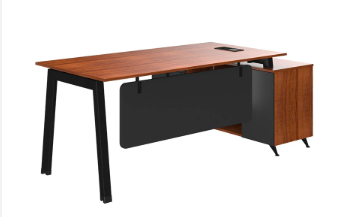Office Desks for Hybrid Work: Adapting to Flexible Working Models

Hybrid working has become the new norm, blending in-office and remote work for employees seeking flexibility and balance. As this model evolves, the role of office desks has taken centre stage in creating productive and adaptable work environments. Selecting the right desk can significantly enhance efficiency, comfort, and well-being for hybrid workers. Here’s an in-depth look at how office desks can adapt to flexible working models and meet the demands of this modern approach.
1. Prioritising Ergonomics in Desk Design
Hybrid workers often spend extended hours at their desks, whether in an office or at home. Ergonomic desks designed to promote healthy posture and reduce strain are essential. Features like adjustable heights, keyboard trays, and sufficient legroom make it easier to work comfortably, whether sitting or standing.
Pairing ergonomic desks with complementary office furniture, such as adjustable chairs, ensures workers maintain proper alignment, preventing discomfort and fatigue during long work sessions.
2. Multi-Functional Desks for Hybrid Workspaces
The flexibility of hybrid work demands desks that serve multiple purposes. A desk with built-in storage, cable management, and integrated charging ports can streamline both professional and personal tasks. These desks are perfect for small home offices where space is limited or for hot-desking environments where employees share spaces.
Opting for desks that accommodate both work and leisure helps create a seamless transition between tasks, allowing users to adapt to varied work demands effortlessly.
3. Compact Desks for Home Offices
Many hybrid workers need to carve out a workspace at home. Compact desks designed for home offices are an excellent solution, offering functionality without dominating the room. Look for desks with foldable or extendable surfaces, which provide extra workspace when needed but can be tucked away to save space.
Incorporating compact yet practical office furniture into a home office not only supports productivity but also enhances the aesthetics of the home environment, creating a pleasant and inspiring workspace.
4. Collaborative Desks for Office Settings
While remote work is a significant part of hybrid models, time spent in the office often focuses on collaboration and teamwork. Desks designed for group settings, such as long tables or modular workstations, facilitate interaction and idea-sharing. These collaborative desks make the most of in-office time by fostering communication and creativity.
To balance individual focus and team collaboration, workplaces can also incorporate adjustable screens or dividers into shared desks, providing privacy when needed.
5. Standing Desks for Dynamic Workstyles
Standing desks have gained popularity among hybrid workers seeking to maintain energy and reduce sedentary habits. Adjustable standing desks allow users to alternate between sitting and standing positions, improving circulation and focus.
For hybrid offices, these desks are an excellent choice as they accommodate diverse user preferences. Whether in a home or shared workspace, standing desks provide flexibility and health benefits for users adapting to dynamic work schedules.
6. Technology-Friendly Desks
Modern work relies heavily on technology, and desks that integrate tech features are invaluable. Built-in charging ports, cable management systems, and wireless charging surfaces keep devices organised and powered throughout the day.
These features ensure that hybrid workers can transition smoothly between remote and in-office work without worrying about technical interruptions. Combining such technology-friendly desks with other smart office furniture creates a future-ready workspace that caters to the evolving needs of modern professionals.
7. Desks with Personalisation Options
Hybrid workers often appreciate the ability to personalise their spaces, both at home and in the office. Desks with modular features, such as attachable shelves, magnetic accessories, or interchangeable parts, enable workers to create a customised setup tailored to their unique needs.
Personalisation enhances not only productivity but also job satisfaction, as employees feel more connected to a workspace that reflects their individual style and preferences.
8. Sustainable Desk Choices
Sustainability is increasingly important in the workplace. Desks made from eco-friendly materials like reclaimed wood or recyclable metal offer an environmentally conscious option for hybrid workers and organisations.
Incorporating sustainable office furniture into hybrid workspaces aligns with broader corporate sustainability goals and appeals to workers who prioritise ethical choices in their daily lives.
9. Modular Desk Systems for Changing Needs
Flexibility is the cornerstone of hybrid work, and modular desk systems allow for easy reconfiguration as needs change. These systems can be rearranged to suit different tasks, whether for solo work or group meetings.
Businesses benefit from modular desks by adapting office layouts to accommodate fluctuations in employee presence, ensuring space is always utilised efficiently.
10. Enhancing Productivity with the Right Desk Setup
The placement and setup of a desk play a significant role in productivity. Positioning desks near natural light sources boosts mood and focus, while adding accessories such as ergonomic monitors, task lighting, and desktop organisers helps create a functional workspace.
By pairing the right desk with carefully chosen office furniture, hybrid workers can optimise their workstations to maximise comfort and efficiency, both at home and in the office.
The Role of Office Furniture in Hybrid Work Success
Office furniture, particularly desks, acts as a foundation for hybrid work productivity. From ergonomic designs to tech-friendly features, the right desks ensure hybrid workers stay comfortable, organised, and focused. Businesses and individuals alike should invest in high-quality office furniture to adapt to the ever-changing demands of flexible working models. With thoughtful choices, hybrid workspaces can become hubs of creativity, collaboration, and efficiency.






